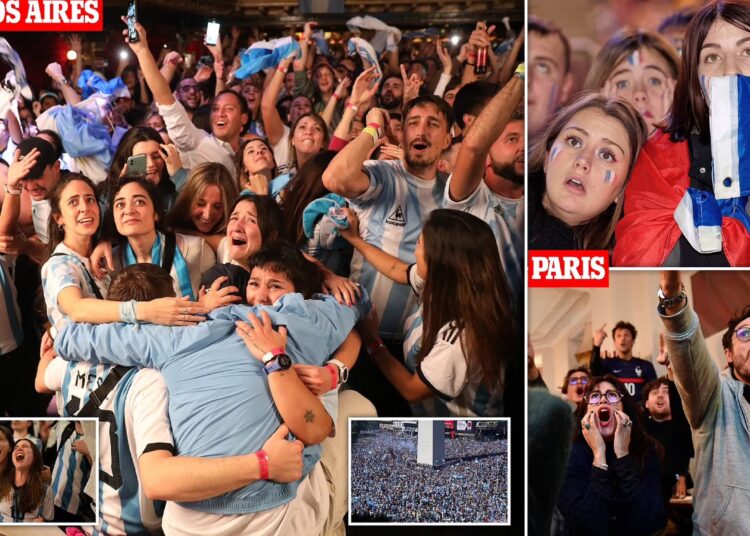BUENOS AIRES/ DOHA – Legendary, greatest, immortal: News media across the planet ran out of superlatives after Lionel Messi led Argentina to victory in one of the most dramatic World Cup finals ever.
The thrilling penalty-shootout win over France gave La Albiceleste their first World Cup since national hero Diego Maradona guided them to the 1986 title.
And it sparked an explosion of joy in Argentina, where the media saluted the nation’s latest generation of World Cup heroes, and their talisman Messi.

Images of him holding the trophy aloft and the team’s celebrations adorned news websites and social media feeds in Argentina, AFP reported.
Messi’s Argentina had won “the greatest final in history”, said the daily La Nacion, while Clarin described it as an “unforgettable” match.
The sports daily Ole’s homepage was splashed with “We are world champions!”
The final was billed as a titanic showdown between Messi and French superstar Kylian Mbappe, and it did not disappoint the neutrals.
While Messi scored from the spot twice to put Argentina in the lead, Mbappe inspired the French fightback with a hat-trick to take the final to penalties.

“Head held high,” read the headline on the front page of French sports daily L’Equipe, the text imposed on an image of Mbappe holding his Golden Boot prize as he walked past the World Cup trophy.
“Legendary,” said the front page of the daily Liberation, with photos of both Messi and Mbappe, while Le Figaro described the French star’s efforts as “heroic”.
‘In the Hand of God’
Messi had cemented his place long ago among the greatest of all time, but the football world was abuzz ahead of the final with the prospect of the fleet-footed magician crowning his glittering career with the World Cup — the one major trophy he had never won.
And with Argentina’s win on Sunday, the debate about his stature in the history of the sport was settled for most.
In Britain, The Times said on its front page that Messi had won the “battle of modern maestros in greatest final”. On the front page of its sports section, it described him as, simply, “The Greatest”.

The Mirror called him the GOAT — “greatest of all time” — while The Sun said the World Cup was “In the Hand of God”, a cheeky reference to Maradona’s infamous goal against England in the 1986 tournament.
In Germany, the Sueddeutsche Zeitung also played on that reference with the headline “The foot of God” for Messi.
It called the Argentina-France showdown “the most exciting final” in World Cup history, while the daily Tagesspiegel said it showcased “two exceptional talents”.
Even in Brazil — an intense rival — the O Globo newspaper paid tribute to Messi, saying football had “paid its debt” to its biggest star.
In the United States, which will host the next World Cup with Canada and Mexico, a report in The Washington Post said Messi was finally rewarded in an “immortal” final.
Argentines erupt in joy
Argentines let loose and streets across the country became places of celebration after an epic World Cup final in which the national team beat France on penalties.

It was the country´s third World Cup title, and the first since 1986.
“I´m very happy, we really deserved this. The team suffered quite a bit, but it recovered as time went on,” said Josefina Villalba, a 55-year-old nanny who joined hundreds of fans at one of the many public plazas where giant screens were set up to watch the long-awaited match.
Millions of Argentine cried, yelled and hugged as they followed the game, which was a rollercoaster of emotions.
“I feel an immense happiness in my heart because this is the first World Cup I truly enjoy,” Hector Quinteros, a 34-year-old security guard, said as his eyes welled up with tears. “This always happens. They always make us suffer.”
At the end of the first half, many were gearing up to celebrate as Argentina led 2-0 and clearly dominated the match but that early happiness turned to anxiety as France caught up and ultimately led the teams to extra time and then penalties.

For many, the agonizing feelings of the match made the victory all the sweeter.
“When you suffer over something so much, the satisfaction is greater,” Fabio Villani, a 45-year-old video editor said according to AP, noting he still couldn´t quite believe Argentina had won a World Cup title.
It also felt par for the course for Argentina, a country known for its seemingly endless economic crises.
“Suffering is something that is very Argentine,” said Maria Isabel Ayala, a 53-year-old hairdresser. “If we suffer, it´s because we truly feel it in our hearts.”
The national squad led by captain Lionel Messi has managed to unite Argentines with a sense of joy that isn’t frequent in a country that has been stuck in economic doldrums for years, is suffering one of the world´s highest inflation rates and almost four in 10 live in poverty.
“We´re very happy that they gave us this triumph that the people needed beyond the socioeconomic problems that we´re having,” Gabriel Fernandez, a 42-year-old artisan, said as he celebrated his victory surrounded by his family in a Buenos Aires park.

On a scorching day, the Obelisk in downtown Buenos Aires quickly started filling with people as thousands went downtown to celebrate.
Shortly after the end of the match, the subway turned into a party as fans packed the cars, singing, chanting and jumping for joy as they headed to join the celebrations at the Obelisk.
“Holding Leo Messi by the hand, we´re going to go all the way,” the crowd chanted as euphoria took over.
Messi scored two goals and then another in a shootout as Argentina defeated France 4-2 on penalties to claim a third World Cup title despite Kylian Mbappe scoring the first hat trick in a final in 56 years.
Now there’s no debate. Messi is definitively in the pantheon of soccer’s greatest ever players, alongside Pele — a record three-time World Cup champion from Brazil — and Diego Maradona, the late Argentina great with whom Messi was so often compared.
Messi achieved what Maradona did in 1986 and dominated a World Cup for Argentina. The torch will one day pass to Mbappe, whose late goals lit up one of the most dramatic finals in the tournament’s 92-year history and made him the first scorer of a hat trick in a final since 1966, but not just yet.
“Let’s go, Argentina!” Messi roared into a microphone on the field in the post-match celebrations.
Messi put Argentina ahead from the penalty spot and played a part in Angel Di Maria’s goal that made it 2-0 after 36 minutes.
Mbappe scored two goals in a 97-second span to take the game to extra time, and then Messi tapped in his second goal in the 109th minute. But there was still time for another penalty from Mbappe to take the thrilling game to a shootout.
Gonzalo Montiel scored the clinching penalty kick after Kingsley Coman had an attempt saved by Argentina goalkeeper Emi Martinez and Aurelien Tchouameni missed for France.
Europe’s run of four straight World Cup winners came to an end. The last South American champion was Brazil, and that was also in Asia — when Japan and South Korea hosted the tournament in 2002.
Argentina won its previous World Cup titles in 1978 and 1986. In Qatar, the country backed up its victory from last year’s Copa America, its first major trophy since 1993. It’s quite the climax to Messi’s international career, which might not yet be over at the age of 35 because he is playing as well as ever.
It was quite the finale, too, for a unique World Cup — the first to be played in the Middle East and the Arab world.






Discussion about this post